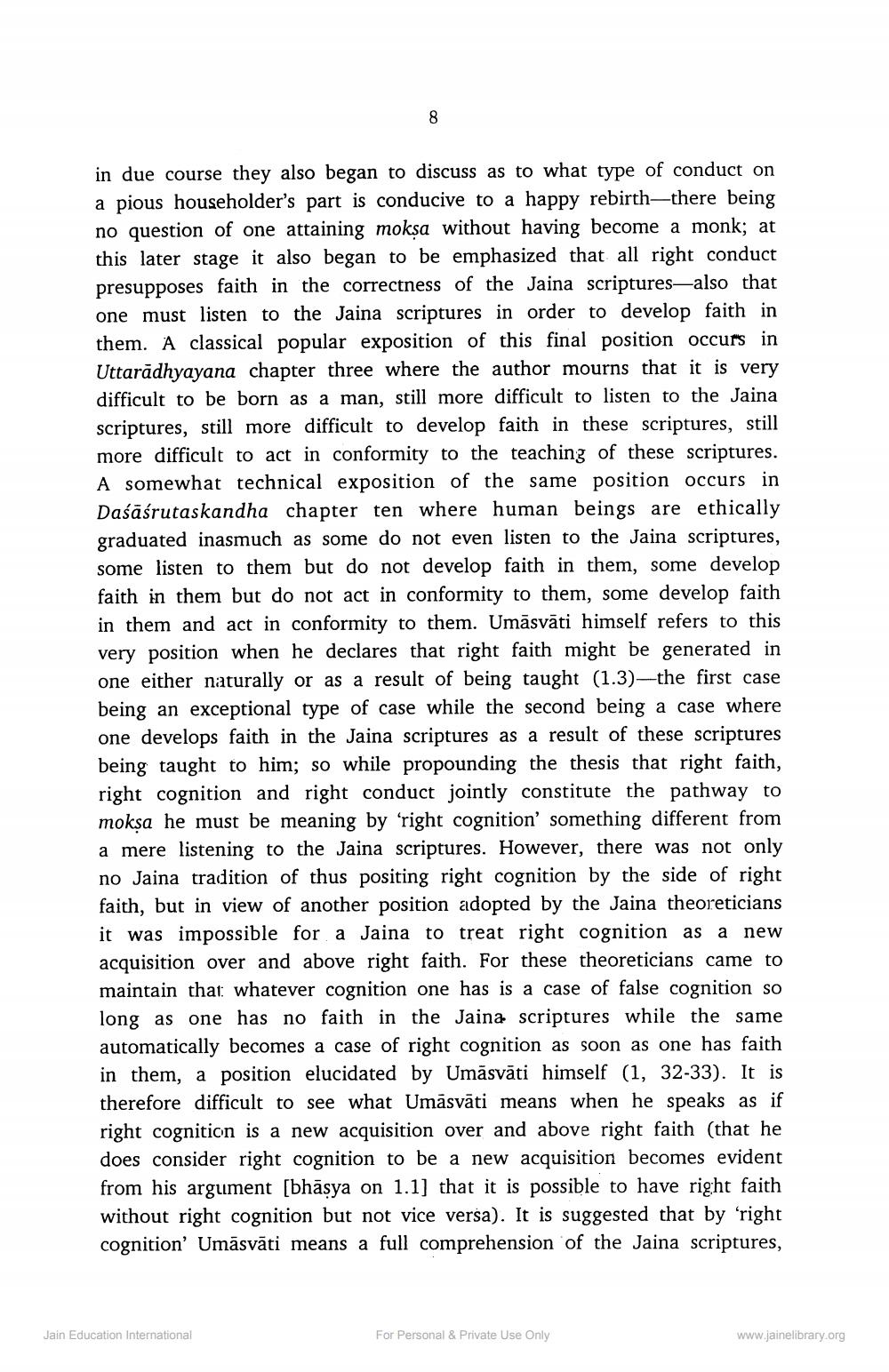Book Title: Tattvartha Sutra Author(s): Sukhlal Sanghavi, K K Dixit Publisher: L D Indology Ahmedabad View full book textPage 9
________________ 8 in due course they also began to discuss as to what type of conduct on a pious householder's part is conducive to a happy rebirth-there being no question of one attaining mokṣa without having become a monk; at this later stage it also began to be emphasized that all right conduct presupposes faith in the correctness of the Jaina scriptures also that one must listen to the Jaina scriptures in order to develop faith in them. A classical popular exposition of this final position occurs in Uttaradhyayana chapter three where the author mourns that it is very difficult to be born as a man, still more difficult to listen to the Jaina scriptures, still more difficult to develop faith in these scriptures, still more difficult to act in conformity to the teaching of these scriptures. A somewhat technical exposition of the same position occurs in Daśāśrutas kandha chapter ten where human beings are ethically graduated inasmuch as some do not even listen to the Jaina scriptures, some listen to them but do not develop faith in them, some develop faith in them but do not act in conformity to them, some develop faith in them and act in conformity to them. Umāsvāti himself refers to this very position when he declares that right faith might be generated in one either naturally or as a result of being taught (1.3)-the first case being an exceptional type of case while the second being a case where one develops faith in the Jaina scriptures as a result of these scriptures being taught to him; so while propounding the thesis that right faith, right cognition and right conduct jointly constitute the pathway to mokṣa he must be meaning by 'right cognition' something different from a mere listening to the Jaina scriptures. However, there was not only no Jaina tradition of thus positing right cognition by the side of right faith, but in view of another position adopted by the Jaina theoreticians it was impossible for a Jaina to treat right cognition as a new acquisition over and above right faith. For these theoreticians came to maintain that whatever cognition one has is a case of false cognition so long as one has no faith in the Jaina scriptures while the same automatically becomes a case of right cognition as soon as one has faith in them, a position elucidated by Umāsvāti himself (1, 32-33). It is therefore difficult to see what Umāsvāti means when he speaks as if right cognition is a new acquisition over and above right faith (that he does consider right cognition to be a new acquisition becomes evident from his argument [bhāṣya on 1.1] that it is possible to have right faith without right cognition but not vice versa). It is suggested that by 'right cognition' Umāsvāti means a full comprehension of the Jaina scriptures, Jain Education International For Personal & Private Use Only www.jainelibrary.orgPage Navigation
1 ... 7 8 9 10 11 12 13 14 15 16 17 18 19 20 21 22 23 24 25 26 27 28 29 30 31 32 33 34 35 36 37 38 39 40 41 42 43 44 45 46 47 48 49 50 51 52 53 54 55 56 57 58 59 60 61 62 63 64 65 66 67 68 69 70 71 72 73 74 75 76 77 78 79 80 81 82 83 84 85 86 87 88 89 90 91 92 ... 596
